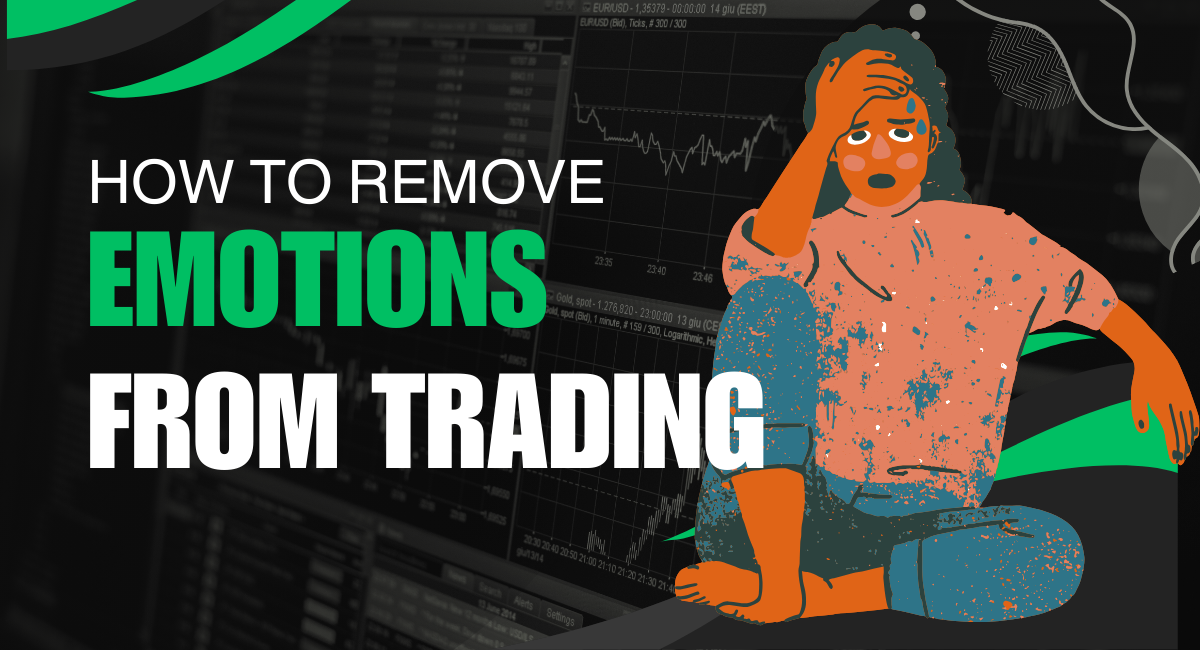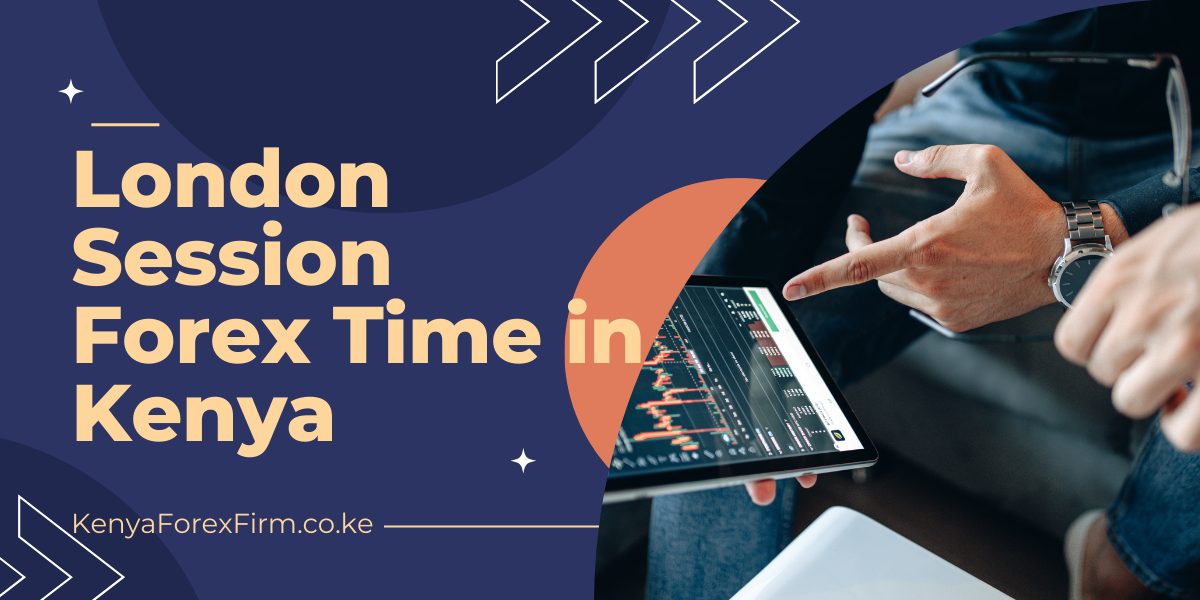How To Remove Emotions From Trading For Good!
Table Contents

Are you tired of letting your emotions dictate your trading decisions, leading to inconsistent results? You’re not alone. Emotions can be the Achilles’ heel of even the most experienced forex traders. Learning how to remove emotions from trading is an essential skill that could significantly up your game and transform you from an average trader to a trading maestro.
If you’ve ever found yourself swept up in the highs of a winning trade or plummeting into despair after a loss, then this article is your go-to guide. We’ll delve deep into actionable strategies that can help you trade with surgical precision, unclouded by emotions. Say goodbye to impulsive decisions and hello to strategic, emotion-free trading.
The Role of Discpline in Removing Emotions from Trading
Everyone says that psychology is the most important part of trading. So if trading is 80% psychology, what makes up psychology?
I believe psychology can be broken down into two parts: patience and discipline. This article focuses on discipline, and why it is so essential in your quest to control emotions in forex trading.
My forex mentor once told me, “If you can’t stick to the rules, you’re gonna have a tough time trading.” And man, was he right! If you want to remove emotions from trading and actually make money, you’ve got to have some ground rules.
These rules help you find the best times to jump into the market, so you have a better shot at making a profit. Now, don’t get me wrong; you won’t win every single time. But if you play your cards right over a bunch of trades, you’ll have the upper hand and are more likely to end up making money in the long run.
The First Step of Removing Emotions from Trading ?
The first step in removing emotions from trading is to have a profitable strategy. And to do this, the best way is to backtest your strategy/system. Prove that it has worked in the past, then forward test it on a demo account or very small risk on a live account.
Forward testing is absolutely essential for any forex trading strategy, as you can guarantee that when real emotions come into play, you need to know that you can execute your system.
Only fools don’t forward test, and only fools trade a system/strategy live straight away on their hard earned money without ever having simulated it for a couple of months.
I know that the temptation to get into the market is strong, but it is a lot easier to lose money in the markets than it is to make money. Therefore the discipline to apply your strategy on a demo account for a 1-2 month period is time well spent, and will arguably end up saving you money in the long run.
When you have a profitable strategy in place, you’re not guessing or acting on a hunch; you’re following a roadmap that has been tested and proven to work. Knowing that your strategy has delivered positive results in the past can give you the confidence to stick to it, even when things get tough. This takes a lot of the emotional weight out of individual trades. You won’t feel the need to “avenge” a loss or double down out of greed because you trust your system.
Consitently Sticking to your Strategy
You can learn to trade, but your edge needs to be applied correctly, consistently to get results. Consistency of results comes from consistency of your actions, and consistency of your actions comes from executing your strategy flawlessly, every time it sets up, on every market you trade.
In order to do this, you must have the discipline to take your trade setups when they occur, and manage your trades as per your rules. This way you are applying your edge in the markets, and only trading when you have your edge. Breaking your rules will typically lead to you losing money. Of course any one trade can always be a winner or a loser, but over a sample of trades, breaking your rules makes using your system/strategy completely pointless.
Consistency only comes from the belief in your strategy. Once you have the belief in your strategy and understand what profits it is capable of generating, you will develop the discipline to trade it.
You should create a Forex Trading Plan, like the one in our Forex Trading Course to help keep you on track while you learn to trade.
Mastering Discipline to Remove Emotions from Trading
As per Wikipedia “Discipline is the assertion of willpower over more base desires, and is usually understood to be synonymous with self-control. Self-discipline is to some extent a substitute for motivation, when one uses reason to determine the best course of action that opposes one’s desires.”
This means we have to use the more evolved parts of our brain to stay disciplined and follow our rules, as opposed to allowing our base desires to take control and wreak havoc.
How to Improve Your Trading Discipline
It’s very easy to tell you that discipline is a key ingredient for removing forex trading emotions , but another thing all together to actually do it.
Trading with your edge is essential to remain profitable, but it’s so easy to slip into bad habits and find an excuse to get into the market even when you shouldn’t. We must remember that following our rules and staying disciplined involves using those higher brain functions.
Testing your systems past performance, then demo trading for a period of time will help you to develop the confidence in your system and the discipline to keep applying it correctly.
If you just decide to start live trading a new strategy without ever having tested it, or simulated trading it on a demo account, you will not have the confidence in the strategy. As a result, you will not have the discipline to trade it.
Testing, demo trading, live trading is a great way to build your confidence, and as a result improve your discipline. At Learn to Trade Online, we suggest trading live almost immediately with very small risk, as you will get to experience in the marketplace, and you get to test the systems. A demo account is very easy to be profitable on, as there is no money at risk…
In a previous tutorial, I talked about the importance of developing a solid trading strategy and sticking to it. These two skills, developing a trading strategy and following it, will determine how profitable you become in forex trading.
Unfortunately, very few forex traders in Kenya are able to practice this trading discipline.
But Why?
The answer lies in emotions.
Human beings have emotions that are hardwired into them. These emotions, which include fear, greed and pride, are strong beasts. You will need to understand how these emotions influence your forex trading decisions and what you can do about them.
So, How Do You Remove Emotions From Trading?
The short answer to this question is that you can’t remove emotions from trading.
As long as you are breathing and your nerves are alive, you are going to experience emotions. They are hardwired into you.
In fact, your decision tolearn how to trade forex is driven by emotions. There is nothing as uplifting as entering into a trade and exiting with a tidy sum of profits. It makes you feel like you are high on steroids. Just accept that as long as you alive, you will be experiencing some pretty intense emotions when you are trading.
Trade What You See, Not What You Think
“The Euro has to go down, Greece, Spain and Portugal are all broke, Italy’s following them, it just has to go down…”
Yeah right!
Trading fundamentals in Forex is a surefire way to go bankrupt. You need to think of Forex as a stupid, slow market place, it is not as reactive to fundamentals as Stock markets, or bond markets.
It’s almost like you need to hit it with a 2 x 4 to the head, before it realises what’s going on. Remember that Forex is the biggest marketplace, so it takes the longest to change direction.
At the end of 2010, the Euro was supposed to be the big short going into 2011. Guess what…4 months straight up! Similarly, at the end of 2011, going into 2012, every man and his dog was short euro right? Wrong, because it went straight up for 3 months.
The important lesson here, is that you must “trade what you see, and not what you think.” Price action doesn’t lie, the verdict is still out on the media.
- If the market is moving up, look to be a buyer.
- If the market is moving down, look to be a seller.
Trading what you think, means that you are trading an idea, guessing where the market is likely to move next. The last time I checked, guesswork was never the most profitable way to trade any market.
How to Effectively Trade What You Know, Not What You Think
-
Firstly we need to know, what is the difference between trading what we see, and trading what we think? Trading what you think, comes down to external distractions, such as current news events, which way your Facebook friends are trading, which country is going bust this week, or what you read in the newspaper last Friday.
-
Trading what we see, all comes down to looking at a chart, looking at the price action, and trading in the direction the market is moving. Price action will tell you more often that not, where that market is likely to move next. Trading with the trend, only enhances our probability of success.
-
Can we quantify a fundamental viewpoint? Very difficult.
-
Can we quantify a price action setup? Absolutely.
As a result, we know that trading strong price action setups in the overall market direction will typically lead to us making money, so why on earth do we feel the need to let fundamentals get in the way?
The simple answer is because we are human. It takes a lot of guts and determination to trade against popular opinion, to take a contrary viewpoint. Sometimes however, that’s exactly what we need to do. Remember that patience is a virtue, and there will always be another trade.
I’ll tell you something that I was told when I first started trading…
- Understand the basics of technical analysis. You don’t need to be a quant-geek to be successful, but understanding the basics would be a great start.
- Understand the basics of fundamental analysis. Pay attention to trends in interest rates, commodity prices, prevailing direction of investment flows, among others.
- When the fundamental and technical outlooks for a currency differ, always side with the technical analysis.
Point 3 hits the nail on the head… Having an understanding of the fundamentals is nice, but it can’t make you any money, and it will probably end up costing you. It also kind of makes point 2, well…pointless.
Understanding Price Action and Technical Analysis, can make you money, as a result that is where your focus needs to be, this brings us back to ‘Trading what you see’ can certainly make you money, but ‘Trading what you think…
Trading what you see means focusing on the cold, hard data in front of you. You look at the charts, the trends, the indicators, and you make decisions based on that information. When you trade what you see, you’re relying on a systematic approach that involves rules and set criteria for making trades. Every action you take is premeditated and part of a broader strategy, which inherently removes the emotional ups and downs that come with impulsive decisions based on what you ‘think’ or ‘feel.‘
Practicing Patience in Forex Trading
Perhaps one of the most important skills that a trader must develop in order to control emotions in trading is “patience”. The ability to let a trade pass them by, safe in the knowledge that there will always be another setup at a later date…
As you learn to trade, you must remember that we are trying to make as much money as possible, while losing as little as possible. We accept that there are going to be losses, but we seek to minimize these losses.
Every time we take a poor trade, through frustration, or anger, or trying to force the market, we take a step backwards – we lose.
Every step back we take, moves us further away from our target. This means that sometimes we need to learn to pass on trades, to realize that “being a pilot on the ground, wishing he was in the air” is far better than “a pilot in the air, wishing he was on the ground”.
Walking away from a trading opportunity is a very difficult thing to do, but sometimes it is necessary to preserve capital and live to fight another day.
Remember that the forex market is open 24 hours a day 5.5 days a week. The markets have been around for longer than any of us have lived, and they will likely continue long after we die. Therefore we need to recognize that there will always be another opportunity. There will always be another trade. We should focus on high probability opportunities, and nothing else.
Think of it This Way…
Let’s say you have a $10,000 account, and you are risking 1% per trade. You are looking to make 1% return per winning trade. If you have 7 losers, and 8 winners, are you at +1%? Yes, No , Maybe?
Well I can tell you now that you’re not at +1%, you’re slightly under that figure. 15 trades for just less than a 1% gain? Yes its positive, but is it not better to simply wait for the high probability trades and take a +1%?
Remember that less is more, and that patience is a virtue. Being prepared to walk away from lower probability opportunities and waiting for the obvious setups is a far more sensible option. It leads to less work for a higher return, which is what we’re all after.
As you learn to trade over time, you will realize that less is more, you want to trade as little as possible to make as much money as possible.
At Kenya Forex Firm, we encourage you to only trade high probability opportunities. Our Forex Trading Course has price action strategies with proven results. Bear in mind that if you trade Daily charts, you can trade from as little as 20 minutes a day…
So remember, it’s ok to walk away from a trade if you don’t like it, in fact I encourage you to do that. Ask yourself if you would put half of your account on the trade, suddenly you’ll find yourself a whole lot more selective…(don’t actually do it though!)
If you’re struggling to get to grips with Forex trading then check out our online forex trading course that is suitable for beginners, intermediate and advanced traders who are looking to make trading a whole lot simpler, and generate an immediate income from Forex.
Getting Rid of Emotional Trading With the KISS Approach
- The KISS approach (Keep It Stupidly Simple) can be applied to many different aspects of life, including managing forex trading emotions. Keeping it Stupidly Simple applies to all aspects of your Trading. From Trading Strategy to Trade Execution to Trade Management.
With Forex Trading, everyone thinks it comes down to the next holy grail strategy, some new fancy indicator or the latest Deriv bot. But the one approach that has stood the test of time, is keeping it simple and trading what you see.
A lof of forex traders think that if they keep searching, they will find the hidden gem that will be their lottery ticket and take them on their way to riches beyond their wildest dreams. This is what typically causes people to blow their accounts, by chopping and changing systems. Always searching for the next best thing, trying to be a Jack of all trades, rather than a master of one.
They never learn to trade one system well, instead they constantly find themselves learning another new trading system in a half-arsed manner, losing 3-5 trades and then not understanding what they’ve done wrong.
This is a flawed approach from the beginning, as the next new system is not likely to be any better than the last.
If you really want to get rid of emotional trading you should should focus on trading what you see on the chart, learning technical analysis, creating a trading plan and executing it flawlessly.
At Kenya Forex Firm, we promote responsible trading, by getting you organized with a price action based trading plan from our online forex course.
In our experience, trading 1 or 2 strategies well, is far better than trying to learn to trade 6 strategies at the same time.
Using the KISS Approach to Trade What You See, Not What You Think
-
Trading what you see through Price Action on the chart is a great way to keep your trading simple with complete control over the emotions of forex trading.
Bear in mind that price action leads everything else. Nothing tells the future, but price action tells you what is happening right now. Price action doesn’t lie.
Beginner and less experienced forex traders typically get caught up in the fundamentals of trading, imagining that the Euro can’t possibly go up against the Pound, or the Aussie will always keep on going up, because it always does right? Marrying yourselves to these positions, before you’ve even looked at a chart is dangerous.
The Forex market is a very slow-moving, stupid market when it comes to fundamentals, you have to hit it with a 2 x 4 to the head before it realizes whats going on, and takes notice of the economic conditions.
Using the KISS Approach to Trade Trade With the Trend
- More money has been made trading with the trend than any other method of trading. After all if a market is going up, trading in the direction of the overall market bias makes sense. Similarly if the market is moving down, trading that way and shorting that market is a sensible thing to do. Therefore one of the most important parts of Keeping it Simple is Trading what you see and Trading with the Trend.
Use this 6 step checklist to get your trading on the straight and narrow.
I hope it helps you with keeping your trading as simple as possible, as effective as possible, and as consistent as possible, without letting uncontrolled forex trading emotions wreck havoc on your account.
- Learn about price action: Learn to trade the price patterns such as pin bars, inside bars, engulfing bars, and other basic price action patterns.
- Study cyclicity and what happens when the market trends, and what happens when the market moves sideways.
- Learn about price action formations such as symmetrical triangles, head and shoulder patterns, and double tops etc.
- Create some rules for your trade entry, trade management, trade exit and risk management.
- Limit yourself to no more than 15 currency pairs.
- Put it all in a plan, write it up, and stick to it like glue.
How to Control Emotions When Trading Forex?
-
You can’t remove emotions from trading. The secret is to understand them, know where they are coming from, and device a plan to deal with them. Of course this is easier said than done, but I have a few tips that should help you:
-
Put your eyes on pips, not dollars and pennies: Don’t let the exact amount of money you are making or losing on a trade distract you. The market does not know how much money you had put into a trade, but it knows where the current price lies.
-
Swallow your pride: The forex market is not about who’s right when. It is all about making money. There is only one way to measure your success in forex trading. Are you making profits or losses? Nothing else matters.
-
You are going to lose money in some trades: Take it to your head. No trader is immune to loses.Just like making profits, taking loses is part of the routine in the forex market. What you need is a solid risk-management strategy to ensure that you loses do not exceed your profits.
Emotions will always be a part of trading—just like they’re a part of being human. The thrill of a winning trade, the sting of a loss, the suspense of waiting for the market to move—it’s all part and parcel of the trading experience. The key, however, isn’t to try and eliminate emotions entirely (good luck with that!), but to manage them in a way that they don’t mess up your decision-making process.
-
Have a Profitable Strategy: The first line of defense against emotional trading is to have a solid strategy that you trust. When you know that your approach has been back-tested and proven to work, it’s easier to stick with it even when emotions are running high.
-
Set Rules and Stick to Them: Create a list of trading rules that outline your strategy, risk management practices, and entry and exit points. Print it out and keep it by your trading station as a constant reminder. When in doubt, consult the rules, not your feelings.
-
Use Stop Losses and Take Profits: Predefined stop losses and take profit levels automatically close out your trades at certain points, which can prevent you from making emotional decisions based on market fluctuations.
-
Journal Your Trades and Emotions: Make it a habit to write down not only the specifics of your trades but also what you were feeling at the time. This exercise can help you identify emotional triggers and patterns that may be affecting your trading.
-
Take Breaks: If you find that your emotions are getting the better of you, step away from the computer. Take a walk, do some deep breathing, or even call it a day and come back with a fresh perspective.
-
Practice Mindfulness: Techniques such as meditation and mindfulness can help you become aware of your emotional state and give you the mental clarity to make rational decisions.
-
Review and Reflect: Take some time at the end of each trading day or week to review your performance. Celebrate your successes but also objectively analyze your losses. Understanding what went wrong in a trade can often be a great lesson in emotional control.
-
Seek Peer Support or Professional Advice: Sometimes, talking through your decisions and emotional state with a fellow trader or a trading psychologist can offer valuable insights into how you can better manage your emotions
- Remember, the goal isn’t to become a trading robot with zero emotions but to become a disciplined trader who knows how to manage forex trading emotions. By taking proactive steps to recognize, understand, and control your emotional responses, you can make more rational decisions that align with your trading strategy and long-term goals.

Patrick Mahinge
Forex Trading Coach
Patrick Mahinge is a seasoned forex trading coach based in Kenya with over a decade of experience in financial markets.
Stay Updated with Forex Insights
Subscribe to our newsletter for expert trading tips, market analysis, and exclusive updates.
No spam. Unsubscribe anytime.
Related Articles
Contents

Patrick Mahinge
Patrick Mahinge is a seasoned forex trading coach based in Kenya with over a decade of experience in financial markets.


